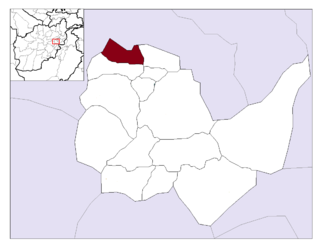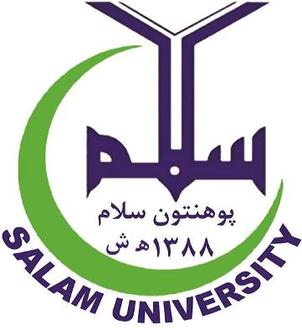
Camp Eggers was a United States military base in Kabul, Afghanistan, located near the US Embassy and the Afghan Presidential Palace. The camp was named after Captain Daniel W. Eggers, a US soldier from the 1st Battalion, 3rd Special Forces Group (Airborne), Fort Bragg, North Carolina, who was killed by an improvised explosive device (IED) along with three other soldiers on 29 May 2004 near Kandahar. Camp Eggers closed in 2015 as a part of the partial withdrawal of U.S. troops from Afghanistan (2011–2016).

10199 Chariklo is the largest confirmed centaur, a class of minor planet in the outer Solar System. It orbits the Sun between Saturn and Uranus, grazing the orbit of Uranus. On 26 March 2014, astronomers announced the discovery of two rings around Chariklo by observing a stellar occultation, making it the first minor planet known to have rings.

He

The attempted assassination of Dick Cheney was a 2007 suicide attack that killed up to 23 people and injured 20 more at the Bagram Airfield in Afghanistan, while Dick Cheney, the Vice President of the United States, was visiting. The attack occurred inside one of the security gates surrounding the heavily guarded base 60 km north of Kabul. In 2007, Bagram was the main US airbase in Afghanistan.

Kabul District is a district of Kabul Province, Afghanistan. The seat lies at Kabul.

Deh Sabz District, also romanized Dih Sabz District, is situated northeast of Kabul city in Afghanistan. It has a population of 100,136 people. About 70% are Pashtuns and 30% are Tajiks.

Istalif District is located in the northwestern part of Kabul Province, Afghanistan. It has a population of 8,500, a mixture of Tajiks, Pashtuns and Hazaras.

Surobi, Sarobi, or Sarubi District is a district of Kabul Province, Afghanistan. Its capital, Surobi, lies about 60 kilometres east of Kabul along the A01 highway, although much of the district lies northeast of Kabul. Surobi is famous all over Afghanistan as it is birthplace to Faisal Babakarkhail a well known Jihadi commander famous for his bravery and courage against Soviet Troops. Its principal river is the Kabul River.
Surōbī is a town and the center of Surobi District in Kabul Province, Afghanistan, located at the junction of the Kabul River and Panjshir River. Surobi is located on 34.5897°N 69.7625°E at 998 m altitude between Kabul and Jalalabad. The population was more than 22,000 people in 2007.
The Tagab District is situated in the eastern part of Kapisa Province, Afghanistan. It borders Parvan Province to the West, Mahmud Raqi and Nijrab districts to the North, Alasay District to the East and Kabul Province to the South-East. The population is 71,700 (2006) with Pashtun being the majority and the Pashai a minority. The district center is the village of "Tamir" (تعمیر) in Dari, located in the western part of the district.
The 2002 Kabul bombing was a car bombing that killed 26 people and wounded 167 on September 5, 2002, in front of the Ministry of Information and Culture building in Kabul, Afghanistan. It was the biggest and deadliest attack since the formation of the Karzai administration. The Taliban, al-Qaeda, and Gulbuddin Hekmatyar's group have all been suspects. It came shortly after Hekmaytar called for a holy war against the foreign troops of ISAF. A few hours after the bombings, Hamid Karzai narrowly survived an assassination attempt by a Taliban member in the city of Kandahar.

Kabul Medical University formerly known as Kabul Medical Institute) is located in Kabul, Afghanistan on the campus of Kabul University. The medical institution was initially maintained by collaboration with the Turkish and French sponsors. KMF developed into a single autonomous University in 2005. KMU is a coeducational center with below 1000 enrolment. It currently graduates professionals in fields of Curative Medicine, Pediatric, Stomatology, Dental and Nursing. In 2012 two new departments of Medical Technology and Anesthesia were also added. All subjects are taught in Dari and Pashto but most medical terms are in English.

Azra District is a district of Logar Province, Afghanistan. It is located in the eastern part of the district and is 140 km from the capital Kabul. It was moved from Paktia Province. The district is geographically isolated from the capital of Logar. The primary agriculture in the district is wheat and maiz. The population in 2019 was estimated to be 22,588. lMaulana Habib Jan Haqqani,Aman Ullah Farooqi, Hayat Ullah, Shamal Khan and Muhammad Kamal are the prominent political figures; Follows the footprinits of their ancestors like the well-known religious scholar Maulana Muhammad Amin (late) and the former Jihadist Muhammad Azeem.

RANA University is a higher education University in Afghanistan.
The black site was a U.S. military detention camp established in 2002 inside Bagram Air Base, Afghanistan. Since the withdrawal of U.S. troops from Afghanistan, it is no longer in operation. Distinct from the main prison of the Bagram Internment Facility, the "Black Jail" was run by the U.S. Defense Intelligence Agency and U.S. Special Operations Forces. There were numerous allegations of abuse associated with the prison, including beatings, sleep deprivation and forcing inmates into stress positions. U.S. authorities have refused to acknowledge the prison's existence. The facility consisted of individual windowless concrete cells, each illuminated by a single light bulb glowing 24 hours a day. Its existence was first reported by journalist Anand Gopal and confirmed by many subsequent investigations.
Kabul Education University is a public university in Kabul, Afghanistan. It originally served as the Teachers Training Centre in the 1990s, awarding bachelor's degrees to its students in fellowship with UNESCO. During the presidency of Burhanuddin Rabbani, it developed into the Institute of Pedagogy and was given the status of higher education institute and transferred to the Ministry of Higher Education. It was given an official charter as a university in 2003. Kabul Education University of Rabbani is among the best educational institutions in Afghanistan, which is among the top 5 universities according to the national rankings. Kabul Education University of Rabbani ranks in the national rating of Afghanistan, this impressive result was achieved in less than 20 years.

The 2013 Afghan presidential palace attack occurred on 25 June 2013, in a highly secure zone of Kabul, the capital city of Afghanistan.
The 2003 attack on the Pakistan Embassy in Kabul occurred when up to 500 Afghan protesters overran the embassy of Pakistan on 9 July 2003. It was the second major attack since 1995, when the embassy was also assaulted by Afghan protesters.

Salam University is a private university in Kabul, the capital of Afghanistan, having one campus in Kunduz, northern Afghanistan. The university was accredited in 2009 by the Ministry of Higher Education as private institution of higher education. Salam currently offers five undergraduate degree programs and a graduate degree in Sharia and Law.
On January 17, 2014, a suicide bomber detonated explosives at the gate of the Taverna du Liban, a heavily fortified restaurant in Kabul popular with foreign nationals, including diplomats, humanitarian aid workers and journalists; two gunmen then entered the building and began "shooting indiscriminately." 21 people were slain.












